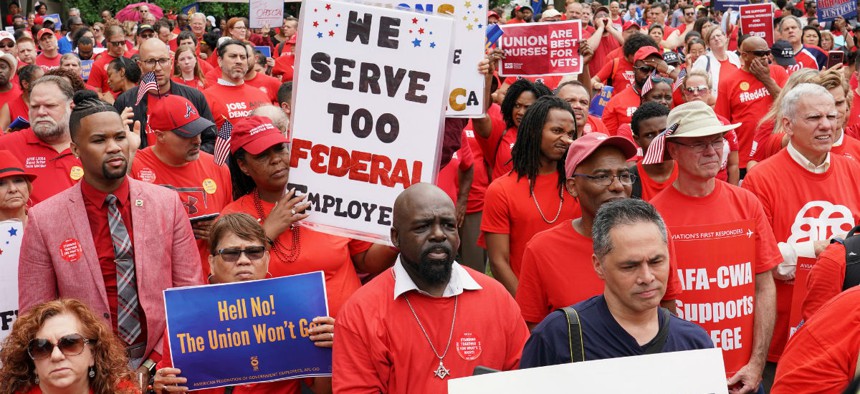
Federal employee unions rally to protest the Trump administration’s anti-union executive orders in July. Jay Mallin/AFGE
Court Lacks Jurisdiction Over Trump’s Workforce Orders, Justice Lawyers Argue
The administration says only the Federal Labor Relations Authority can review unions’ legal challenge. But the president has failed to nominate a general counsel, rendering it unable to function.
Attorneys with the Justice Department on Friday filed a 100-page legal brief in support of its appeal of a U.S. District Court ruling that invalidated the key provisions of President Trump’s three controversial executive orders targeting federal employee unions and making it easier to fire federal workers.
The Trump administration is challenging an August ruling by District Judge Ketanji Brown Jackson preventing agencies from implementing a trio of executive orders that sought to make it easier to fire federal employees, set time limits on collective bargaining negotiations, and restrict the use of official time by union employees.
In its filing, the government argued that the U.S. District Court for the District of Columbia lacked the jurisdiction to weigh in on unions’ legal challenge, and that it should have been the sole purview of the Federal Labor Relations Authority. And Justice Department lawyers argued that the judge’s decision relied on a “misinterpretation” of “goal-setting provisions” laid out by the executive orders as edicts.
“The district court recognized that the orders’ goal-setting provisions expressly admonished that agency negotiators must still bargain in good faith, but the court nevertheless speculated, without any basis in fact or law, that merely being subject to presumptively reasonable goals would invariably cause negotiators to bargain in bad faith,” the government wrote.
In her ruling, Jackson wrote that the executive orders, when taken together, disregard Congress’ conclusion in the 1978 Civil Service Reform Act that good-faith labor-management negotiations are “in the public interest.”
"As to the merits of the unions’ contentions, while past precedents and pertinent statutory language indicate that the president has the authority to issue executive orders that carry the force of law with respect to federal labor relations, it is undisputed that no such orders can operate to eviscerate the right to bargain collectively as envisioned in the [statute]," she wrote. "In this Court’s view, the challenged provisions of the executive orders at issue have that cumulative effect."
In its filing, the Trump administration revived an argument initially brought up during the district court proceedings: that only the FLRA can hear challenges regarding collective bargaining issues. In oral arguments over the summer, federal employee unions argued, and Jackson agreed, that the FLRA can only hear cases regarding specific unfair labor practice complaints, and that appeals of such decisions also would be confined to how regulations are applied, not the regulations’ constitutionality.
“The [FLRA] has jurisdiction to consider the interaction of the [Civil Service Reform Act] with other statutes that give [the Office of Personnel Management] and the president authority to prescribe regulations . . . and to determine if such regulations operate . . . to remove the duty to bargain over contrary proposals,” the Justice Department wrote. “[In] any event, the district court erred because the general rule, applicable here, is that [the U.S. Court of Appeals] may consider claims even if the authority lacks jurisdiction to do so.”
Left unsaid by the Trump administration attorneys is the fact that the FLRA currently cannot hear any new cases. Nearly two years into his term, the president has neglected—on purpose, union officials have alleged—to nominate an FLRA general counsel, the post responsible for bringing unfair labor practice complaints before the body for adjudication.
Attorneys took their arguments one step further in their appeal, suggesting that the statute allows agencies from refraining from bargaining altogether.
“Unions have no role in determining whether bargaining over these permissive subjections will occur: that choice is made ‘at the election of the agency,’” they wrote. “Nothing in the statute or the case law so much as suggests that there is a duty to bargain in good faith over permissive subjects absent an agency’s election to do so, or that there is a duty to bargain in good faith regarding whether the agency will make that election.”
The more than a dozen unions involved in the case now have until February to issue their response.







